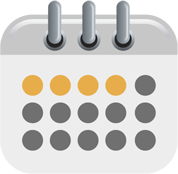CogniFit – Planning
Confirm that the use of assessments and training is for yourself You are going to create a personal account. This type of account is specially designed to help you evaluate and train your cognitive skills
Please confirm that the use of cognitive training and assessment is for your patients. You are going to create a patient management account. This account is designed to give your patients access to CogniFit evaluations and training
Confirm that you want to offer training and/or cognitive assessments to your family or friends. You are going to create a family account. This account is designed to give your family members access to CogniFit evaluations and training.
Please confirm that the use of cognitive training and assessment is for research study participants. You are going to create a research account. This account is specially designed to help researchers with their studies in the cognitive areas.
Please confirm that the use of cognitive training and assessment is for your students. You are going to create a student management account. This account is designed to give your students access to CogniFit evaluations and training.


You and Your Team Series
Resilience Is About How You Recharge, Not How You Endure
How to Evaluate, Manage, and Strengthen Your Resilience
You’re More Resilient Than You Give Yourself Credit For
Just as we tend to recognize that skills like creativity, analysis, or writing can come much easier to some than to others, ease with planning is something that we’re either born with or we’re not. But it doesn’t mean that we can’t develop those skills by actively building neuro-connections in our brain through persistent practice.
As a time management coach, I’ve intuitively picked up on the importance of this truth. I’ve seen clients who have never been able to plan effectively in their entire lives develop this skill simply by looking for help, keeping at it, and pushing through the struggle — essentially, building resilience.
Recognize your natural strengths and weaknesses. If you find planning extremely difficult, you likely don’t have natural brain dominance in the back-left part of your brain. To find out what part of your brain dominates, do the self-assessment in the book Thriving in Mind or participate in the more formal Benziger Thinking Styles Assessment. Learning this can help you better understand what works for you and then use that to adjust your habits. By taking the Thriving in Mind self-assessment, for example, I gained clarity on why certain types of work came so naturally to me and why I found myself avoiding other types of tasks.
Accept the difficulty. If we think something should be easy when it’s hard, we tend to get upset and are more likely to give up. But if we set expectations that a task will be difficult, we may still flounder, but we’re more willing to work through any issues, since we understand that challenge is part of the process. When my coaching clients first start planning, they describe it as frustrating, disorienting, tiring, or even anger-inducing because they don’t want to accept the limits of reality in terms of how many activities can fit in a day. The clients who accept and work through those feelings are the ones who make the most progress. They find that on the other side, they have more peace, more confidence, and more clarity on how to structure their time well.
Let go of all-or-nothing thinking. One interesting phenomenon I’ve observed with people whose natural brain strength is not in planning is that they tend to fall into all-or-nothing thinking. They think that they must follow their plan perfectly, or their efforts have been wasted. Or if they can’t plan every day, they shouldn’t plan at all. Instead, view learning as a process where improvement counts and every day matters. This will build your resilience because you won’t beat yourself up as much when you deviate from your plan, and in turn, you will find it easier to get back on track.
Find systems that work. Instead of forcing yourself into an established scheduling process, find a system that works for you. For example, if you tend to have a strong tendency toward visuals (a common front-right brain dominance quality), find a way to organize that takes that preference into account. Put to-do items on sticky notes, draw on whiteboards, or use mind maps. If you love spreadsheets (often found when you have a strong front-left brain dominance), put your to-do lists and plans in Excel, or consider using apps that will allow you to track your progress in a numeric fashion. If you like to see time as a flow and rhythm (a favorite of back-right dominance), use tools like paper lists that will allow you to adapt and adjust the cadence of your day as needed, instead of feeling boxed into rigid time frames. There is no wrong way to plan. Experiment until you find the right fit.
Borrow other people’s brains. If you know people who excel in planning or have organization skills, ask for their advice and insight. They may be able to easily offer potential solutions to problems that overwhelm you. Getting suggestions from others on organization systems that you can then test, instead of trying to develop your own, can save you lots of time. A few caveats: Avoid critical people who may discourage you in your learning process. Change is tough enough without being torn down. Second, ask them for simple solutions. Don’t aim for expertise in an area when you’re just learning; a basic level of knowledge is a good start.
Keep trying. One of the definitions of resilience is “the ability to spring back into shape.” When you find yourself getting frustrated in the process of planning, have self-compassion when you make mistakes, refocus when you get distracted, and adjust your plan when new issues crop up. For example, you may decide to move a project you thought you would get done today to the next day. Or you may reach out to a colleague for help on getting a certain deliverable done.
Resource:
https://www.cognifit.com/science/cognitive-skills/planning
https://hbr.org/2017/07/a-way-to-plan-if-youre-bad-at-planning
https://online.hbs.edu/blog/post/how-to-develop-strategic-thinking-skills

